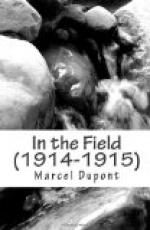This idea occurred to me suddenly and obsessed me. Yes, yes, presently the great snorting, whistling, pitiless thing would fall between O. and me. We should feel nothing; there would be no pain. We should be only a little heap of bloody clay, and to-morrow at daybreak our comrades would but have to throw a few spadefuls of earth upon it. They would put a plain wooden cross above, with our names and ranks, the number of our regiment, a date: “November 3, 1914.” And it would be better than any sumptuous monument.
“Hush! Listen!”
Between two explosions, in spite of the noise of the German bullets, we distinctly heard the crack of our carbines.
“Our men are fighting!”
We all understood, and with one bound we were up and running frantically through the wood. How was it that none of us were killed? How did we manage to escape the shells and bullets which were cropping the branches and felling the trees around us? I shall never understand or forget this experience.
When at last we sprang breathless into our trench after what had seemed an interminable race, the tumult had died down again and only occasional shots broke the nocturnal calm. The reason of the sudden renewal of the fighting was given at once by F.
“Bravo!” he cried; “we have retaken the infantry Chasseurs’ trench!”
This was a great consolation to us, for we were all full of regret at the loss of this little piece of ground. It had prevented us from feeling quite satisfied with our day.
Now all was well. Our task was accomplished.
* * * * *
On the following day, November 4, at three in the morning, a battalion of the —— Regiment of the Line came to relieve us. It formed part of that glorious 20th Corps, which has covered itself with glory ever since the beginning of the war, and fought all along the front from Lorraine to Flanders, always arriving at the moment when picked men were needed to make a last desperate effort. It had come up that evening, and was at once on the spot.
In the cold, luminous night, the heavily laden infantrymen defiled into the narrow trench, calm, silent, and serious.
The officer who was to take my place presented himself smartly, as if on the parade-ground.
“Lieutenant X.”
I gave my name.
“My dear fellow,” he said, “I am delighted to shake hands with you. Allow me to say how much we all admire your regiment. Your General has just told us how your Chasseurs have behaved. Accept my congratulations. We could not have done better ourselves. The cavalry is certainly taking first place as a fighting force. Your regiment is to be mentioned in despatches, and you deserve it. Good-night. Good luck!”
“Thank you! Good luck!”
* * * * *
Once more we passed through the wood to take up our position in reserve. Our men were beginning to feel the fatigue of those two days without sleep and almost without rest.




